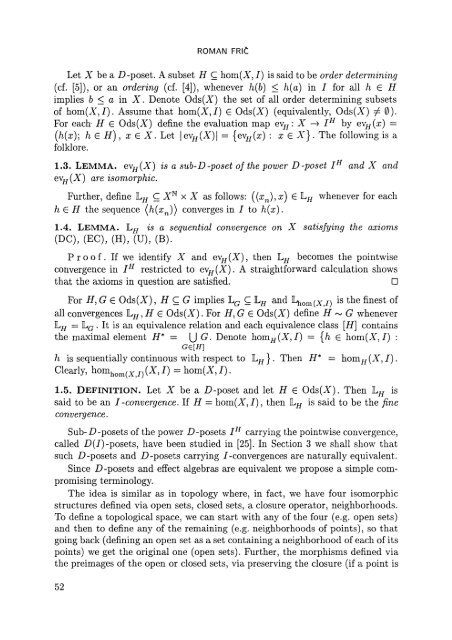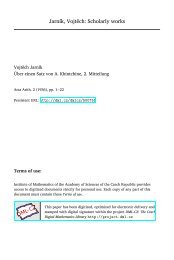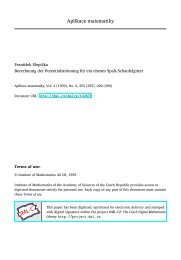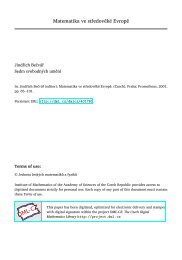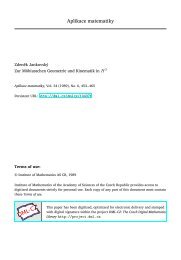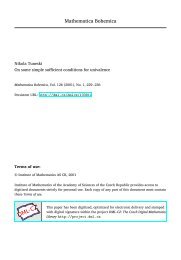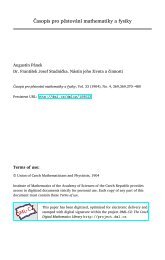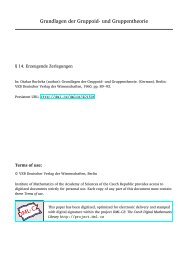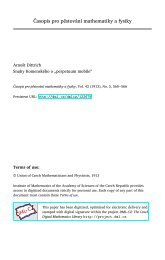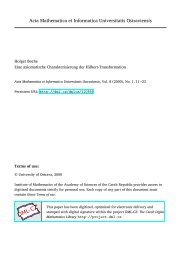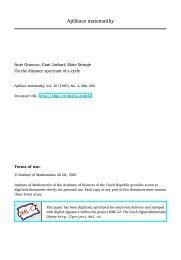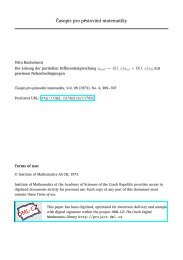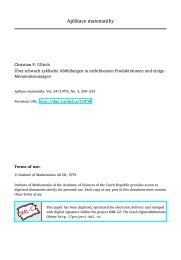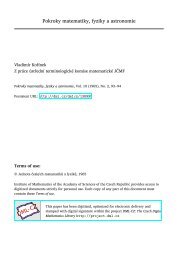Duality for generalized events
Duality for generalized events
Duality for generalized events
You also want an ePaper? Increase the reach of your titles
YUMPU automatically turns print PDFs into web optimized ePapers that Google loves.
ROMAN FRlC<br />
Let X be a D-poset. A subset H C hom(X, I) is said to be order determining<br />
(cf. [5]), or an ordering (cf. [4]), whenever h(b) < h(a) in I <strong>for</strong> all h G H<br />
implies b < a in X. Denote Ods(X) the set of all order determining subsets<br />
of hom(K,i~). Assume that hom(X,J) G Ods(K) (equivalently, Ods(X) ^ 0).<br />
For eaclr H G Ods(X) define the evaluation map evH: X —•> I H by evH(x) =<br />
(h(x)\ he H), x e X.Let \ evH(X)\ = {ev^(x) : x G X). The following is a<br />
folklore.<br />
1.3. LEMMA. evH(X) is a sub-D-poset of the power D-poset I H and X and<br />
evH(X) are isomorphic.<br />
Further, define LH C X N x X as follows: ((xn),x) G hH whenever <strong>for</strong> each<br />
h G H the sequence (h(xn)) converges in I to h(x).<br />
1.4. LEMMA. hH is a sequential convergence on X satisfying the axioms<br />
(DC), (EC), (H), (U), (B).<br />
Proof. If we identify X and evH(X), then hH becomes the pointwise<br />
convergence in I H restricted to evH(X). A straight<strong>for</strong>ward calculation shows<br />
that the axioms in question are satisfied. D<br />
For H,G G Ods(X), H C G implies LG C LH and \om(xj)<br />
ls the finest of<br />
all convergences hH, H G Ods(X). For H,G G Ods(X) define H ~ G whenever<br />
L^ = LG . It is an equivalence relation and each equivalence class [H] contains<br />
the maximal element H* — \J G. Denote hom^(X,/) = {h G hom(X, I) :<br />
Ge[H]<br />
h is sequentially continuous with respect to L^}. Then H* = hom//(X,I).<br />
Clearly, homhom(x/)(X,7) =hom(X,7).<br />
1.5. DEFINITION. Let X be a F>-poset and let H G Ods(X). Then LH is<br />
said to be an I-convergence. If H = hom(X, 7), then hH is said to be the fine<br />
convergence.<br />
Sub-D-posets of the power D-posets I H carrying the pointwise convergence,<br />
called jD(/)-posets, have been studied in [25]. In Section 3 we shall show that<br />
such D-posets and D-posets carrying /-convergences are naturally equivalent.<br />
Since D-posets and effect algebras are equivalent we propose a simple compromising<br />
terminology.<br />
The idea is similar as in topology where, in fact, we have four isomorphic<br />
structures defined via open sets, closed sets, a closure operator, neighborhoods.<br />
To define a topological space, we can start with any of the four (e.g. open sets)<br />
and then to define any of the remaining (e.g. neighborhoods of points), so that<br />
going back (defining an open set as a set containing a neighborhood of each of its<br />
points) we get the original one (open sets). Further, the morphisms defined via<br />
the preimages of the open or closed sets, via preserving the closure (if a point is<br />
52


